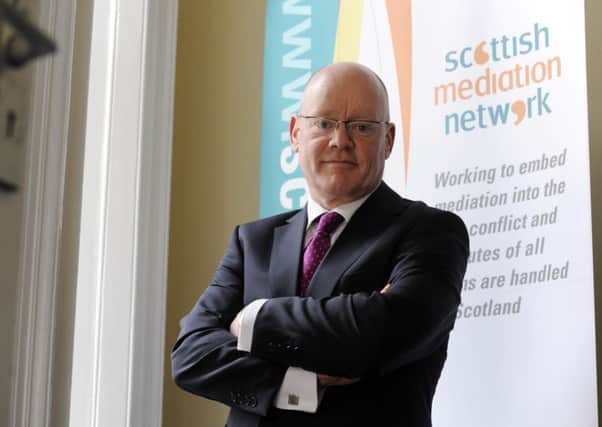Teach mediation to all and reap the benefits


This got me thinking about what it would be like to be on a mediation demonstration and what we would be chanting. I suppose the chant would be “What do we want?” – the answer to which would be “More mediation!” This would be followed by the qualification “When do we want it?” and the answer “Now”.
And so as I look to the forthcoming Scottish Parliament election, I’ve been asking myself what would “More mediation – Now” look like.
Advertisement
Hide AdAdvertisement
Hide AdI think the first thing that I would look for would be some sort of statement of intent to maximise the use of mediation across Scotland. Marco Biagi MSP, minister for local government and communities, said at our conference: “Mediation and the values of mediation are at the heart of what we want to see in society and government in Scotland.”
There are some excellent examples of where mediation is successfully used in parts of government. However, such a message could facilitate wider adoption and create an environment where experience could be shared and innovation from that experience could in turn have a transformative impact across government.
Beyond a wider commitment to the use of mediation and its skills, there are some clear opportunities to deliver improvements by using mediation on one hand and by spreading the skills of mediation on the other.
If I was to choose one area where I would make mediation available for people, it would be in the justice system to help resolve disputes. There are two key ways of making this happen. The first would be that information about mediation and encouragement to use mediation should be given at the early stage of disputes and, should they reach court, at that stage, too. The second would be that mediation services should be readily accessible across Scotland.
Access to appropriate mediation information should be available as early as possible should a dispute arise. Critically it should be suggested before people go to court as the earlier people can have a conversation, the earlier they are likely to be able to find resolution.
There also needs to be a way to connect parties to mediators. For those involved in low value cases there should be free/low cost services available to those wishing to mediate. Such a provision would take cases out of the court system freeing up valuable judicial time in what are overworked courts at present. For higher value cases parties would be able to access mediators directly through the Scottish Mediation Register or through their solicitors, who are currently under guidance to provide information about all forms of dispute resolution.
As regards making the skills more widely available I would make mediation skills a part of the Curriculum for Excellence and have peer mediation schemes in every Scottish school. Mediation is currently being used as an intervention to prevent and deal with homelessness, to resolve disputes surrounding relationships and to help people in the workplace. By getting peer mediation training in schools those issues won’t necessarily be resolved but they would certainly help to make those interventions less required.
Finally, I would encourage mediation to become part of the essential training for all staff across all organisations in society. That would enable a better culture of conversation, with the wide range of benefits that would bring.
Advertisement
Hide AdAdvertisement
Hide AdIn the run-up to the election, these are sorts of actions that mediators will be asking of the political parties and I would hope also after 5 May, or I may have to start making some banners and organising a demonstration myself.
l Graham Boyack is director of the Scottish Mediation Network